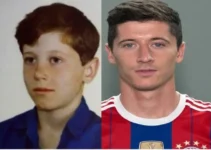Rio Ferdinand, often hailed as a United legend, has become a beloved figure in the world of football, admired by fans far beyond Manchester. While many former players struggle to find widespread acceptance as television pundits, Ferdinand stands out—largely due to the values instilled in him from an early age. His upbringing in Peckham, as one of six children in a large family, shaped his character and laid the foundation for his career and personality.
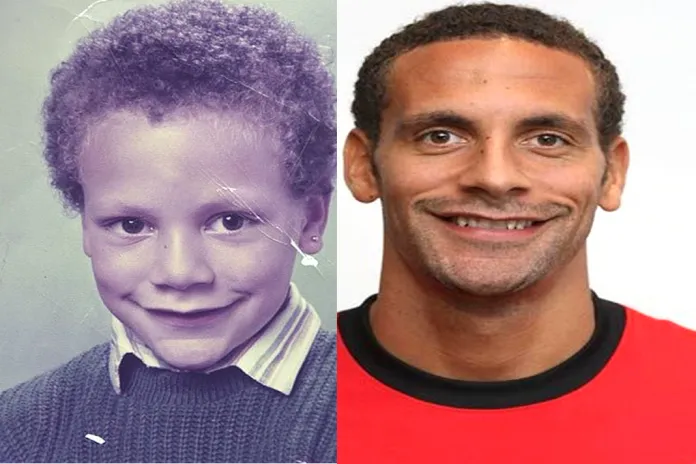
From Peckham Dreams: The Inspiring Journey of Rio Ferdinand
This is not your typical article about career stats or football achievements. Instead, it delves into the story of Rio’s formative years, growing up as the son of a tailor. Despite witnessing his parents’ separation at the age of 14, Rio found solace in football, where his confidence blossomed. He was a restless child, always eager to explore something new, and football became his outlet for self-expression.
His journey to becoming the man he is today was filled with moments of joy and hardship, shaping him both on and off the pitch. This article tells the lesser-known story of how those early experiences, from his parents’ influence to his love for the game, paved the way for his success.
Rio Ferdinand Childhood Story – Early Life and Family Background:
Rio Gavin Ferdinand was born on November 7, 1978, at King’s College Hospital in London, United Kingdom, to his late mother, Janice Lavender, of Irish descent, and his father, Julian Ferdinand, who hails from Saint Lucia.
Interestingly, Rio’s mother was just 17 years old when she gave birth to him. Despite growing up primarily alongside his younger brother, Anton, Rio was part of a large extended family. He spent his childhood in Peckham, a vibrant and diverse area of London, which would later become known as the hometown of another footballer, Ademola Lookman.
Peckham, with its tough streets and tight-knit community, played a key role in shaping Rio’s character and determination, setting the foundation for the man who would go on to become one of football’s greats.
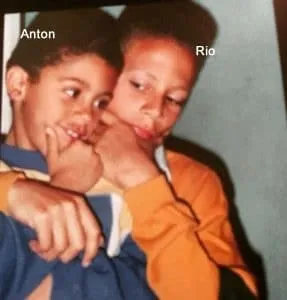
Meet young Rio Ferdinand and his brother, Anton, in their childhood years.
Both parents worked so hard to support the family. Back then, his late mother was a child carer, and his father was a tailor.
Truth be told. Ferdy’s parents never got married, and they separated when he was 14 years old. Before separating, both parties promised to still remain close to their children.
It was Ferdy’s father, Julian, who had custody of his children. He moved his family to a nearby estate. As a way of bonding, he takes young Rio Ferdinand to football training and to local parks.
This was because little Ferdy developed an interest in football at that time. Despite his love for football, education was still a prerequisite.
Education and Career Buildup:
Young Rio, or “Little Ferdy,” as he was fondly called, attended Camelot Primary School. While he had a knack for maths, one of his most memorable school moments came when he got the chance to perform in the school production of Bugsy Malone. This experience gave him a taste for stepping outside his comfort zone.
In his own words, Rio reflected on his restless nature:
“I always, as a kid, wanted to do something different. I’d get bored very easily—even playing football or hanging out with my mates. So traveling away from home and meeting new people … I enjoyed it.”
This adventurous spirit set the stage for his journey beyond Peckham, both in life and in football. Little Ferdy later chose to attend Blackheath Bluecoat School in a bid to make new friends and settle in well, feeling his confidence growing, as seen below.

Ferdinand had a passion for physical activities, which extended far beyond just football. He participated in gymnastics, drama, theatre, and even ballet, showcasing his love for movement and expression. A talented and versatile child, Ferdinand earned scholarships for his abilities and proudly represented Southwark in gymnastics at the London Youth Games.
Career Story:
By the age of 10, Rio Ferdinand’s football journey truly began when he was invited to train at the Queens Park Rangers academy. Even at a young age, his natural talent was clear. When he was just 11, his youth coach, David Goodwin, famously said, “I’m going to call you Pelé, son, I like the way you play.”
Initially, Ferdinand started as an attacking midfielder, but his physical attributes quickly made scouts realize he had the potential to become a dominant centre-back. His footballing home, however, would be London’s West Ham United, where he joined the youth system in 1992.
In 1994, Ferdinand played alongside future stars like Frank Lampard. He progressed through the ranks, making his Premier League debut in 1996. His growth continued after a loan spell at Bournemouth and a key transfer to Leeds United, where his performances caught the eye of Manchester United.
In 2002, United came calling, and the rest, as they say, is history. This move solidified Ferdinand’s legacy as one of the greatest defenders of his era.
Rio Ferdinand Relationship Life:
The legendary Rio Ferdinand married his late wife, Rebecca Ellison, a former fitness trainer whom he met during his time at West Ham in the late 1990s. Their bond grew strong, and they built a family together, but tragedy struck in 2015 when Rebecca passed away at the age of just 34.
Her passing left Rio devastated, but her story and legacy live on. How did Rebecca’s life unfold, and what led to her untimely death? In this piece, we take a closer look at her journey, from meeting Rio to the heartbreaking end of her life.
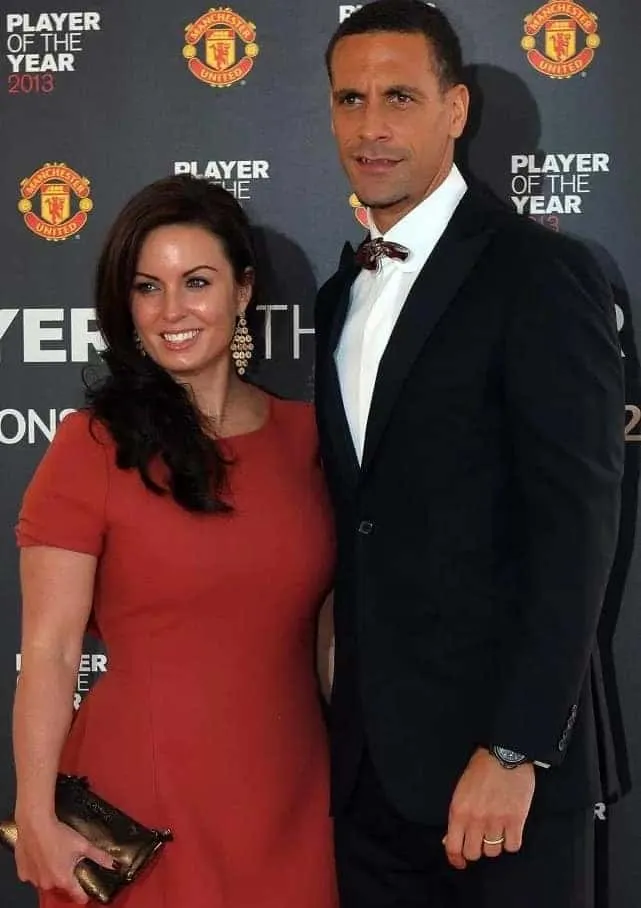
Meet Rebecca Ellison, Rio Ferdinand’s late wife.
The Wedding:
Originally from Essex, Rebecca Ellison kept a low profile throughout her life. Before marrying Rio Ferdinand in 2009, she pursued a career as an accountant after transitioning from her role as a fitness trainer. The couple exchanged vows in a lovely, intimate ceremony in the Caribbean, surrounded by their closest friends and family. Rebecca’s quiet strength and dedication to her family were central to her life, and her bond with Rio remained strong until her passing in 2015.
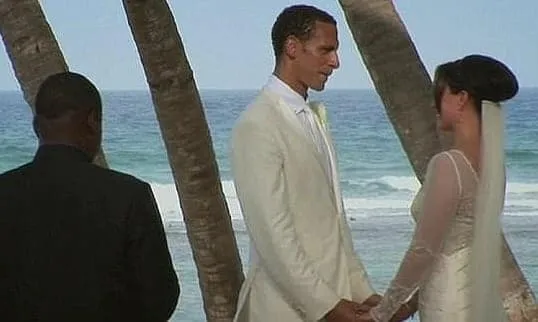
She gave birth to the couple’s first son, Lorenz, in 2006, and a second son called Tate, followed three years later.
They welcomed a daughter called Tia in 2011, and at around the same time, the family moved back to London following a stint in Manchester when Rio played for United.
Before her death, Rebecca had kept her illness private after being diagnosed with cancer in 2014. After receiving treatment, she thought she was clear of the disease in 2014.
Unfortunately, the cancer returned and spread to her bones. When her death was announced, it prompted an outpouring of grief from the footballing world.
Rio confirmed his beloved wife’s death in a heartbreaking statement that read:
“My soulmate left us last night. Rebecca, my beloved wife, passed away peacefully after a brief struggle with cancer at the Royal Marsden Hospital in London. She was an incredible, loving mother to our three wonderful children and will be profoundly missed as a wife, sister, aunt, daughter, and granddaughter. Her memory will continue to inspire us and guide us in our lives.”
In a heartfelt moment, Rio recently shared what he would say to Rebecca if he had just one more minute with her. Appearing in an emotional advert for Child Bereavement UK, he expressed,
“If I could have one more minute with Rebecca, I’d probably—no, I’d definitely—ask her what she wanted for the children as they grow up, especially during those significant moments in their development. And above all, I would tell her I love her.”
About Rio Ferdinand’s Late Wife – Death Aftermath:
Rebecca was laid to rest in May 2015 following a private ceremony in Kent. The funeral was attended by many of her husband’s teammates, including former Manchester United manager Sir Alex Ferguson.
Others also paying their respects were Robin van Persie, Edwin van der Saar, Nemanja Vidic and Darren Fletcher. The service was described as a celebration of Rebecca’s life. Her three children chose the music that would be played.
They were left alone, all with their dad. While the elder two know about their mother’s death, the last-born child would ask her dad several questions about her mother’s whereabouts.
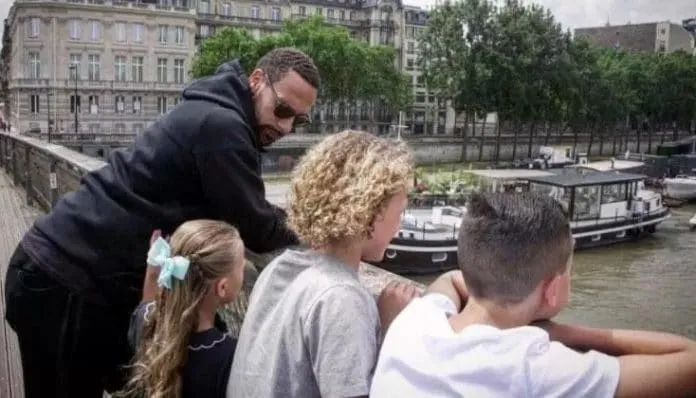
Rio’s Reaction to Her Death:
Ferdinand admitted that he turned to drinking in the immediate aftermath of Rebecca’s death.
Following the death, Rio has admitted that his “world collapsed”, and he initially turned to alcohol to deal with his grief, but is now focusing on being a loving dad to his kid.
In his words…
“It is only nights that can still undo me. I usually wake up between 2-3am, when the horror of what my children have lost hits me again, keeping me awake until dawn.”
The death of his wife finally forced his retirement from football – quite similar to the sad story of Ronaldinho and Adriano.
Rio Ferdinand breaks down during the filming of the BBC documentary about losing his wife.
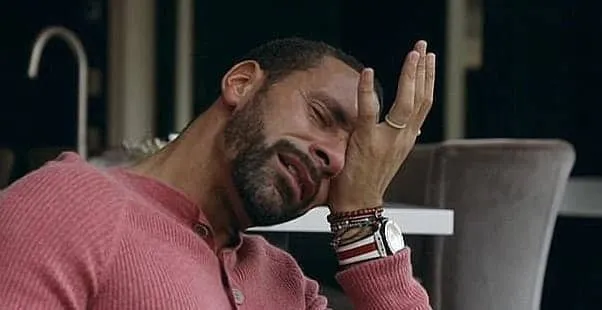
The hour-long documentary aired on BBC One saw Rio talk about his life as a widower, a mum and a dad. The programme also explored how bereaved parents manage grief and support their children–and shared how the only way they can truly support them is to rebuild their lives.
Rio also met with other parents struggling with bereavement and explained his own struggles surrounding trying to bring up his three children by himself.
A New Relationship:
Recently, it has been reported that Rio has struck up a relationship with former Towie star Kate Wright and the pair were spotted enjoying drinks with each other in London. Kate is responsible for mending Ferdy’s broken heart.

The pair has been keen to keep their romance away from the spotlight. This made Kat also quit the Essex reality TV show after weeks of speculation.
Rio Ferdinand Family Life:
This is Rio Ferdinand’s family, which includes most members of his family. The photo showed Sian (second from right) posing with her half-brothers Rio and Anton (far left and right), brother, father and mother (centre) with the caption.
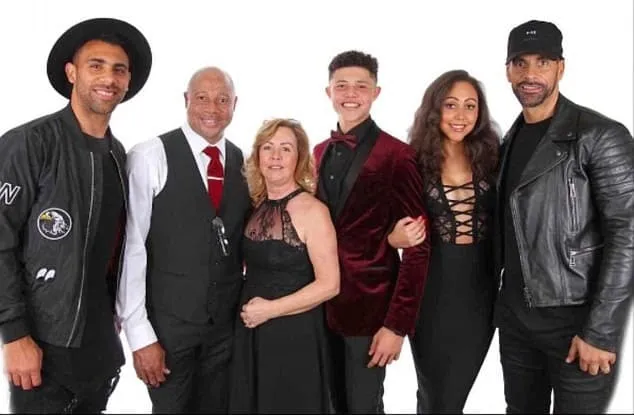
This ‘my forever squad’ photo was cut short only recently as a member of his family passed on. Rio Ferdinand’s Irish mother, Janice Lavender, left the family at an early age in her 50’s.

As stated earlier, his late mum began dating Julian Ferdinand, whose family is from St Lucia (similar origins to James Justin‘s late Dad), as a teenager, and they later had two children together, Rio and Anton. Their separations gave birth to her Lavender surname.
Both lived on a council estate in Peckham and never married. After they split up, Janice eventually married Peter St Fort, with whom she had a daughter, Sian and a son, Jeremiah.
Rio has often referred to his mother, Janice, as a “supermum,” acknowledging the immense effort she put into raising him and his younger brother, Anton. He shared how she would “cook and clean and move heaven and Earth to ensure we got to school and youth clubs on time.”
Her dedication and unwavering support played a crucial role in their upbringing, helping to shape the men they would eventually become.
About Rio Ferdinand’s Mum:
Ferdinand’s mother faced significant racism during her relationship with his father. As Ferdy recalls, “When they were dating with deep affection for one another, passers-by would spit on his late Mum because she was walking out with a black guy.”
These experiences not only highlighted the challenges his family faced but also shaped Ferdinand’s understanding of prejudice and resilience from a young age.
Rio Ferdinand’s mother, Janice St Fort, was described as a ‘devoted mother’ and ‘an inspiration. In 2017, she died after a battle with cancer. She was described as ‘the backbone of the family’ Janice St Fort was aged 58 when she died in hospital with her family at her bedside.
Before her death, Janice Lavender once came under considerable strain as she watched her sons become publicly embroiled in a race row with former England captain John Terry.
About Anton Julian Ferdinand:
(born 18 February 1985) is an English footballer who plays for Southend United as a defender. Just like his brother, he was a product of the West Ham United academy.
Once upon a time, it was alleged that John Terry maliciously called the ex-Queens Park Rangers defender Anton, a ‘f****** black c***’ during a match on October 23rd.
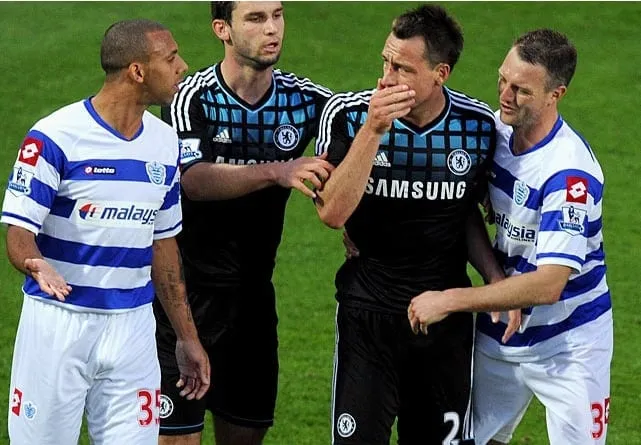
The issue of Anton Julian Ferdinand and John Terry.
Rio Ferdinand Sisters:
The England and Manchester United Legends do have half-sisters. They are Sian (middle left), Chloe (middle right), Anya (far left) and Remi Ferdinand (far left). Sian is more beautiful than the others.
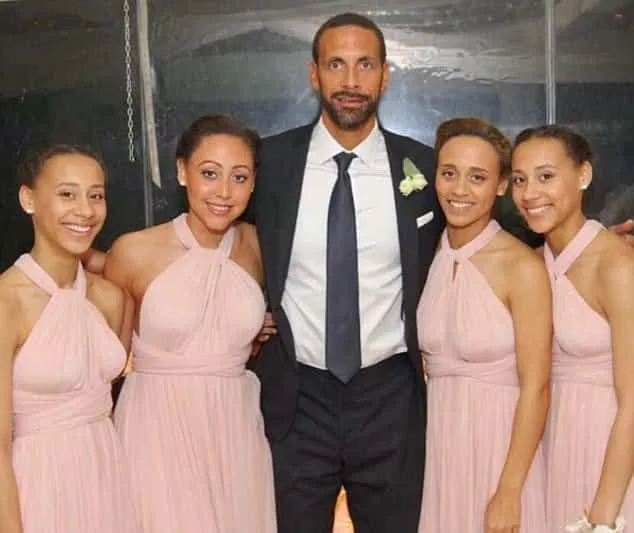
Meet the look-alike sisters of Rio Ferdinand.
Racism:
Once upon a time, Derbyshire Police said they were investigating an original Tweet from Rio Ferdinand after receiving complaints from members of the public.
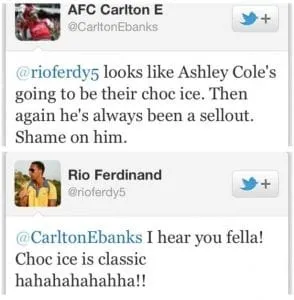
The ‘choc ice’ term is understood to mean ‘black on the outside, white on the inside. Following the FA’s ruling, the brothers staged their own protests by refusing to wear T-shirts in support of football’s anti-racism campaign Kick it Out.
Video Appearance:
In 2000, Ferdinand made headlines for a brief appearance in a sexually explicit video filmed at the Ayia Napa resort in Cyprus, alongside fellow English footballers Kieron Dyer and Frank Lampard.
The video resurfaced in 2004 when Channel 4 aired a clip as part of their documentary Sex, Footballers and Videotape, stating that it was included to “remind the viewer that this is based on real life.”
This incident highlighted the intersection of celebrity culture and the often scrutinized private lives of professional athletes.
The Alleged Assault:
In 2002, during the r*pe trial of their acquaintance Martin King, Rio Ferdinand and former Leeds teammate Michael Duberry faced serious allegations. They were accused of being involved in an incident at the Leeds nightclub Hi-Fi on January 22, where it was claimed that Duberry had molested a woman and Ferdinand had threatened her. The police conducted interviews with both men, but in April 2003, the Crown Prosecution Service announced that no charges would be brought against them. King was ultimately found guilty of indecent assault and attempted rape.
Years later, in October 2006, Ferdinand found himself in hot water during a radio interview on The Chris Moyles Show. He sparked controversy and received two listener complaints after using a derogatory term while joking with Moyles, who had suggested he was homosexual. Ferdinand quickly apologized, saying, “I’m sorry, I’m sorry, I’m sorry. I’m not homophobic.” While BBC Radio 1 dismissed the exchange as banter, gay rights campaigner Peter Tatchell expressed concern but later stated that he accepted Ferdinand’s apology and chose to move on.
Rio Ferdinand Ashley Cole Feud:
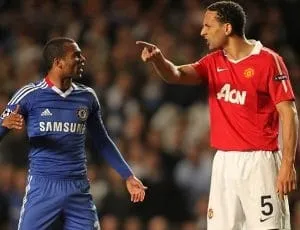
John Terry was found not guilty of racial abuse in the court case involving him and Rio Ferdinand’s brother, Anton. Following the verdict, Rio stirred up controversy by reacting to a Twitter user who referred to Ashley Cole, a witness in Terry’s favour, as a “choc ice”—a slang term interpreted by many as meaning “black on the outside, white on the inside.”
Ferdinand quickly deleted the tweet and insisted that “choc ice” was not a racist term. He added,
“And if I want to laugh at something or someone tweets… I definitely will! Hahahahaha! Now I say… stop getting ya knickers in a twist!”
In response, Cole’s lawyers issued a statement saying he would not pursue the matter further. However, PFA chief Clarke Carlisle condemned Ferdinand’s remarks as “insensitive and untimely.”
In August 2012, Ferdinand faced a £45,000 fine for his Twitter comments after an Independent Regulatory Commission investigated and found him guilty. He was guilty of bringing the game into disrepute with an “improper” remark that included a bad reference to “ethnic origin, colour or race.” This incident highlighted the complexities surrounding race and language in football.
Jamaican bash:
In October 2014, Rio Ferdinand faced another charge from the FA for using offensive language on Twitter. He referred to the mother of a critic as a “sket,” a Jamaican slang term for a promiscuous woman. As a result, Ferdinand was fined £25,000 and received a three-match ban.
The FA cited Ferdinand’s status as a “role model” as an aggravating factor in determining the penalty, especially since this was his second Twitter-related offence within three years. It’s important to note that Ferdinand never admitted to any wrongdoing in this incident.
Gambling:
In March of 2015, it was announced that Rio would become the new face of the online casino Casino Floor. This decision sparked significant criticism on Twitter, with many followers voicing their concerns about the appropriateness of a role model endorsing gambling.
Critics highlighted the well-documented struggles faced by many of Ferdinand’s peers, pointing out that gambling has led to serious issues for some athletes and their families. This backlash raised important questions about the responsibilities of public figures in promoting such activities.
Kick Boxing:
After retiring from football in 2015, following a successful and trophy-laden career with Manchester United, Rio Ferdinand shifted his focus to an unexpected venture: professional kickboxing, a sport once practised by Rico Lewis.
This surprising announcement came just two years after he had tragically lost his wife to cancer, marking a significant transition in his life. Ferdinand’s decision to pursue boxing reflected his determination to channel his grief and energy into a new challenge.
Driving Ban History:
In March 2003, Rio Ferdinand faced a six-month driving ban for exceeding the speed limit, after being caught driving at an average speed of 92 mph (148 km/h) on the M1. He was fined £2,500 and received six penalty points on his license.
His driving troubles continued in May 2005 when he was criticized by a magistrate for receiving his fourth ban. This time, he was fined £1,500 for travelling at an average speed of 105.9 mph (170.4 km/h) over nearly two miles on the M6 motorway. During the sentencing, the magistrate emphasized that Ferdinand should serve as a leading and positive role model for young people, stating that his actions did not convey the right message.
The Artist:
In 2005, Rio Ferdinand teamed up with an old school friend to launch the record label White Chalk Music. To date, the label has signed two artists: Melody Johnston and Nia Jai. Notably, Nia Jai released an album on October 6, 2010, which features Ferdinand himself rapping.
Ferdinand also ventured into the film industry in late 2008 when he financed and served as an executive producer for Alex de Rakoff’s film Dead Man Running, which stars Danny Dyer and 50 Cent in a gangster-themed storyline. He shared production credits for the film with his England teammate Ashley Cole. Additionally, in 2008, Ferdinand produced a documentary focusing on Peckham, aiming to steer young people away from a life of crime and inspire positive change in their lives.
Appreciation Note:
Thank you for exploring our piece on Rio Ferdinand’s childhood and the untold facts of his biography. We are committed to providing fair stories about Manchester United and other club’s football legends. If you’re interested, be sure to check out the life histories of Roy Keane and Paul Scholes, which are sure to captivate you. If you notice anything that seems off in this article, please feel free to leave a comment or reach out to us!
